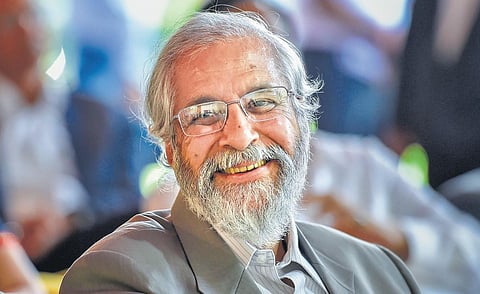

As the friction between the government and the judiciary over the appointment of Supreme Court and high court and judges continues, former SC judge Justice Madan Lokur says the ‘basic structure doctrine’ has been accepted in several jurisdictions, and if it goes, the fundamental rights too will go along with it. The tug-of-war between the judiciary and Union Law Minister Kiren Rijiju has intensified in recent times as he termed the collegium system as ‘opaque’ in judicial appointments. Excerpts from an interview with Preetha Nair:
Union Law Minister Kiren Rijiju has endorsed the views of a retired high court judge, who said the Supreme Court “hijacked” the Constitution by deciding to appoint judges itself. Your reaction.
It is not clear what the Hon’ble Minister is trying to say. He should clarify. Is he suggesting that the judges of the Supreme Court are not sane? I hope not.
The CJI said the ‘basic structure doctrine’ was like ‘North Star giving direction to the Constitutions when the path ahead is convoluted.’ Do you think the attack on the basic structure is leading to a dangerous situation? What are the implications?
It is unfortunate, but not dangerous. The ‘basic structure doctrine’ has been accepted in several jurisdictions as mentioned by the Chief Justice. It will need a Bench of 15 judges to overthrow it. That’s never going to be easy and I hope that day does not come to pass. If the ‘basic structure doctrine’ goes, all our inalienable and fundamental rights will also go sooner than later.
The CJI’s remarks came against the backdrop of Vice President Jagdeep Dhankhar’s recent criticism of the scrapping of the NJAC Act in 2015, his questioning of the Kesavananda Bharati case verdict, and the assertion that Parliament is supreme. How worrying is the trend?
No comment on that, except that it is very worrying.
Earlier, the SC collegium made public its reasons for reiteration and the government’s objection to appointing at least three advocates as HC judges. Do you think the SC and the government have to be more transparent to end the stalemate?
Yes, there is a need for transparency without harming the reputation of any person. Justice Brandeis of the US Supreme Court had earlier said, “Sunlight is said to be the best of disinfectants”. This pithily sums up the transparency issue.
The escalation in the tussle between the government and the judiciary is being seen as an extraordinary attack on the latter and to make it subservient…
The ‘tussle’ is not unprecedented. An attempt to have a committed judiciary was earlier made by former Prime Minister Indira Gandhi, but it failed. The government is following in the footsteps of Mrs Indira Gandhi.
The Minister has sent a follow-up letter on the restructuring of the Memorandum of Procedure (MoP) of the collegium system as directed by the Constitution bench. Can a government representative be included in the collegium?
The collegium is a collegium of judges. A person who is not a judge cannot be included in the collegium. It is up to the judges of the collegium to consult persons other than judges while taking a decision. In the past, the opinion of lawyers was taken by judges in the collegium.
Since 2015, different drafts of the MoP have been exchanged between the government and the CJI’s office. What is the point of contention here?
The government should disclose the letter in which the objections have been raised.
As far as I know, three objections were raised by the government. If I remember correctly, one was to the effect that a person who is a threat to national security cannot be appointed as a judge. Fair enough. But, tell me, does the government expect the collegium to recommend a person who is a threat to national security? Frankly, I don’t remember the other two objections.
If the minister’s suggestions are put into practice, what could be the fallout if a government representative is included in the collegium, whereas the existing system comprises only senior judges? Opposition parties call this remedy a poison pill for an independent judiciary…
The attempt of the government seems to be to have a committed judiciary. If we don’t have an independent judiciary, you can imagine the consequences.
The government claims that the collegium lacks transparency and the role played by the government in choosing judges is important since judges do not have access to reports and other information that the government has...
The government sends all reports to the collegium. If the government withholds information from the collegium, it is very unfortunate.
Several legal luminaries have pointed out that there are inherent flaws in the collegium system. What is your view? What reforms are needed to make the system accountable and transparent?
Nobody says that the collegium system is perfect. No method of selection can be perfect.
The selection process should be rigorous, and attempts should be made to minimize errors. Some reforms are needed everywhere.
Finally, what are your suggestions to end the impasse?
The functionaries concerned should sit across the table and have a dialogue in the best interest of the country.